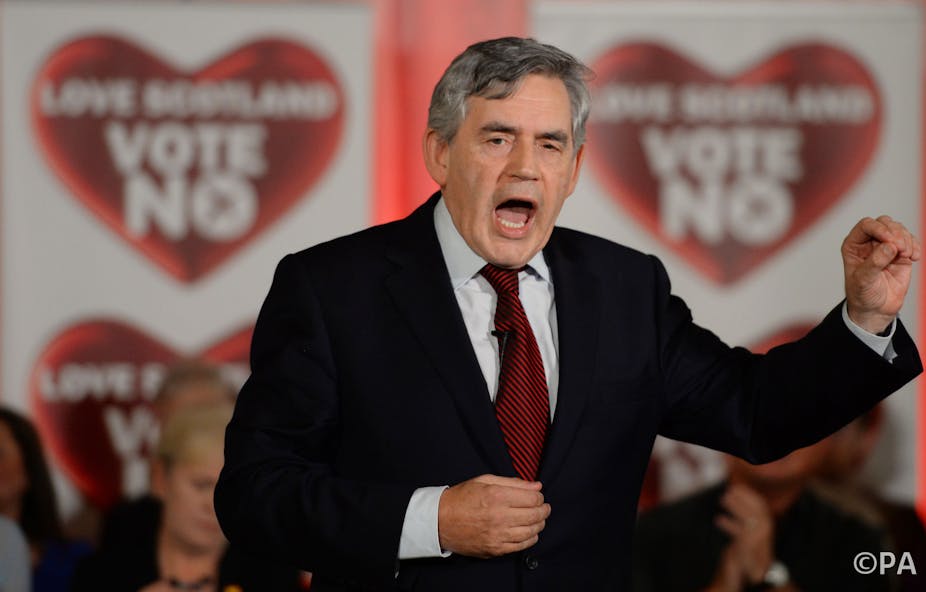In the last three weeks of the Scottish referendum campaign, Gordon Brown had already emerged as the galvanising force on the No side. This reached new heights on Wednesday in Glasgow when he made what has been described as the speech of the campaign.
“This is not their flag, their country, their culture, their streets,” he told his community-centre audience. “This is everyone’s flag, everyone’s country, everyone’s culture and everyone’s streets.
"Let us tell the people of Scotland that we who vote No love Scotland and love our Scotland.”
Having been bypassed in the earlier part of the campaign when efforts were being channelled mainly through the cross-party Better Together organisation, Brown became the central figure on the No side, injecting passion, energy and fresh arguments into a campaign that, before his interventions, was seen to lack all three.
Heartland Labour voters switching to Yes and the consequent surge in support caused panic on the No side at the beginning of September. This was the catalyst for Brown’s greater involvement. After that, he was the most effective speaker in challenging the SNP and rallying Labour support for a No vote, especially in the final days.
The Brown book
Early in the summer the former prime minister produced a very personal book: “My Scotland, Our Britain,” which argued that sharing and solidarity within the UK offered a preferable future for Scotland than independence. His analysis of the shortcomings of the No campaign was particularly penetrating. It put up the hackles not just of Better Together leader and former chancellor Alistair Darling, with whom personal relations had previously broken down, but also with many fellow MPs who supported running a negative campaign.
Brown argued that instead of communicating messages to voters such as: “Britain says no to Scots participation in the pound” and: “Britain says no to further defence work” and: “Britain says Scots will go bankrupt”, it would be better to highlight the fact that pensions, the welfare state and the national health service depend on the UK-wide system of pooling and sharing of resources that would, in his view, be the first casualty of Scotland’s departure from Britain. Above all, Brown argued that Labour had to speak the language of patriotism, to join the fight to define Scottishness rather than allow the nationalists to turn the campaign into a choice between Britain and Scotland.
The federalist convert
During most of the campaign, there was a marked reluctance in the leadership of the No campaign to discuss proposals for constitutional change. The only proposals on the table when Brown’s book appeared were for further fiscal devolution, which many in the Westminster parties supported on the basis that having to raise tax revenues would force Alex Salmond to face up to spending constraints and take responsibility for decisions.
Instead Brown advocated a 10-point plan to strengthen the powers of the Scottish parliament and provide additional safeguards to Scots. Having resisted the notion of federalism throughout his political career, he is now advocating moving towards it despite the challenges that poses in a multi-national state where one political entity, England, makes up 85% of the whole.
Brown played a hugely significant role in saving the union. His was the strongest and arguably the most intellectually engaged voice on the No side of the argument. He was the driving force behind the agreement by the three main Westminster parties in the closing weeks of the campaign to a timetable for more devolution.
He was also behind the further commitment to retain the Barnett formula and protect the Scottish health service. At a time of crisis, Brown offered a way forward in a context where he had no formal role – he was neither leader of his party, nor leader of the campaign. The extent to which his ideas have been adopted across the political spectrum at Westminster and the effect his involvement has had are remarkable – a true political resurrection.
The only poll that matters
Brown will rightly be given much of the credit for turning round a campaign that looked like it might come off the rails.
Neither are the implications of Brown’s intervention confined to Scotland. What he persuaded fellow politicians to accept as the price of saving the union could change the dynamics of constitutional arrangements at Westminster too. How that manifests itself – and the implications of moving significantly further down a federalist route – remain to be debated.
Both Scottish politics and UK politics will have to adapt to the outcome of a referendum that much of the establishment north of the border and all of it south of the border had imagined was never in doubt.
And a politician who many thought had ended his career and disappeared off the political stage suddenly occupied the centre of it, hinting along the way that he might stand for the Scottish parliament. He may yet have transformed the backdrop against which future political battles will be fought.

